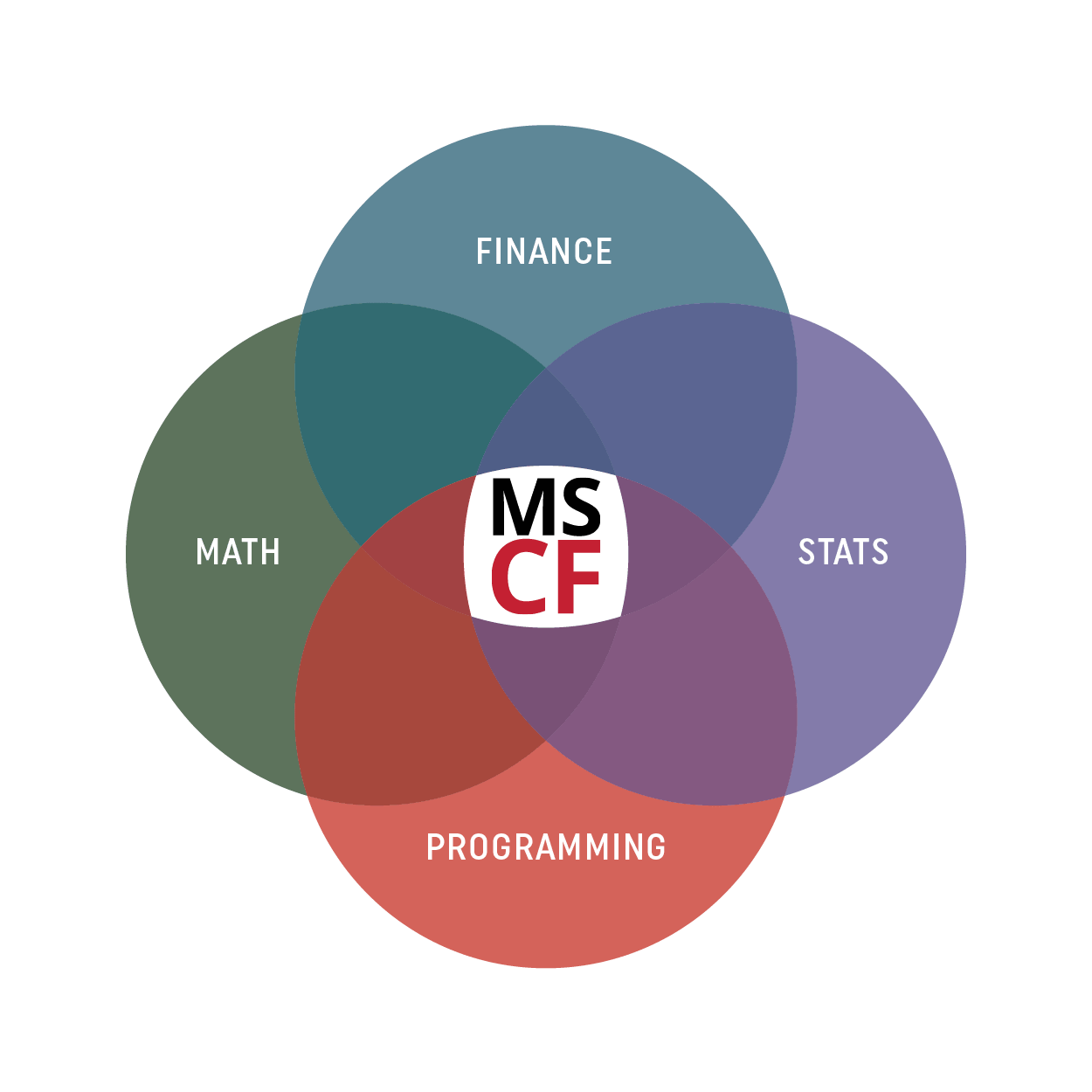https://www.cmu.edu/mscf/academics/curriculum/index.html
Curriculum
The MSCF course of study is a mix of traditional lectures and individual and group projects. You will learn traditional finance theories of equity and bond portfolio management, the stochastic calculus models on which derivative security trading is based and computational techniques including Monte Carlo simulation, optimization and the numerical solution of partial differential equations using C++ and Python. You will take a sequence of data science, machine learning and time series courses and apply these methods in courses on asset management, statistical arbitrage, risk management and market microstructure. A required summer internship puts the skills learned in the MSCF program to use in industry. The program concludes with a semester-long, company-sponsored project course in machine learning and a capstone course in financial engineering. A strong emphasis is placed on communication skills throughout the program.
All MSCF courses are developed expressly for the intended career paths of our students with introductory courses in the early fall leading to core courses throughout the first year followed by additional core courses and various electives in the final semester, allowing you to focus on the area of quantitative finance of most interest to you.
The MSCF curriculum is constantly changing to meet the needs of the financial markets. In addition to excellent mathematical preparation for investment banking roles creating and validating the models underlying much of the finance industry, our statistics and programing courses will prepare you for careers in data-driven algorithmic trading, risk management, fintech and quantitative portfolio management.
MSCF Prep
In the beginning of August, four weeks before the start of the degree program, the “MSCF Prep” session provides preparatory classes in math, probability and financial markets. In addition, working with your career counselors, you will learn about the various quantitative finance career paths, build your resume and learn networking and interviewing skills from MSCF’s full-time communications coach and our alumni. A required, online Python course is offered in July.
MSCF ProbabilityPrep MSCF Programming
Prep MSCF Math
Prep Communication
Prep Financial
Markets Linear
Algebra
Year 1
Over the Fall and Spring of your first year, you will learn traditional finance theories of equity and bond portfolio management, the stochastic calculus models on which derivative trading is based, Monte Carlo simulation methods for computing prices and risk measures, statistical methodologies including regression and time series, and financial data science. C++ and Python are woven throughout the curriculum to provide you with the software skills you will need throughout your career. A presentations course will help you communicate your ideas to your peers. The Financial Engineering course requires you to work on a team to solve a problem and sell your solution. Throughout, courses offered by the Communication Development Program will build your confidence as you learn deportment, networking and effective writing — in short, how to function on Wall Street.
Mini 1:
FinancialComputing I Financial Data
Science I Fixed
Income MSCF
Investments MSCF Business
Communication I
Mini 2:
Financial DataScience II MSCF
Options Multi-Period
Asset Pricing Machine
Learning I MSCF Business
Communication I
Mini 3:
FinancialComputing II Simulation Methods
for Option Pricing Machine
Learning II Stochastic Calculus
for Finance I MSCF Business
Communication II
Mini 4:
FinancialComputing III Financial Time
Series Analysis Stochastic Calculus
for Finance II Presentations for
Computational Finance MSCF Business
Communication II
Summer Internship
You will learn about the inner workings of the financial markets through your required summer internship, returning to the program in the fall with a much better sense of the full-time position you wish to pursue. Recruiter interest in our students is strong and our career counselors will work closely with you to assist you in the internship search. Over the last three years, 100% of our students have obtained internships. Of those, 87% have been in the United States. 63% of MSCF Students in 2019 received return full-time offers following their Summer Internship.
Year 2
For the final semester, following your summer internship, you will take a mixture of required and elective courses. The elective courses permit you to specialize in quantitative research, financial computing, asset management, algorithmic trading, and risk management.
Mini 1:
FinancialOptimization MSCF Studies in
Financial Engineering
Electives: Choose two of three
Advanced
Derivative Models Machine Learning
Capstone Project Risk
Management
Mini 2:
Macroeconomics forComputational Finance
Electives: Choose three of four
Asset
Management Financial
Computing IV Machine Learning
Capstone Project Market Microstructure
& Algorithmic Trading
The MSCF program reserves the right to change course times and offerings.
Students will be notified of any changes via email.
